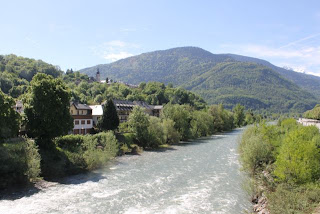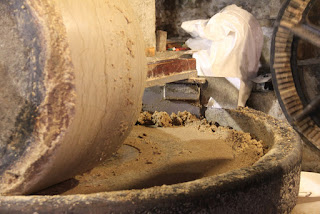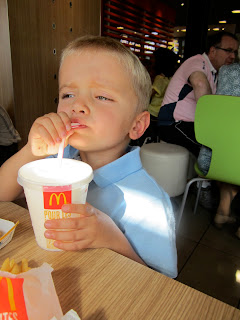As perhaps a final salute to our time in France, I made a rough recording of a song I wrote to try and capture something of our little alpine town. There are obvious images which, for those of us who lived there, recall various everyday sights and sounds, and for those who haven't, hopefully share something of the world around us, like a little musical scrapbook.
Beyond that, the song is trying to describe something of the ambiguity of "post-Christian" Europe. Beautiful scenery, walking to the bakeries, narrow streets. On the other hand, things that are just a bit off, maybe more than a bit tragic: Empty churches, war memorials that bespeak of not-too-distant loss. And yet, even there, where perhaps the masses have decided to abandon God, his grace falls like the rain, and his goodness abounds. It's a mixed goodness, like all that we would experience on this Earth, but, in the words of Buechner: "What's lost is nothing to what's found. And all the death that ever was, if you set it next to life, would barely fill a cup."
It's a fact to be learned anywhere in this wide world.
(sorry, the web music player I was using is not working currently. So, the only way to listen is to follow the link and download. I swear it's a clean file, having placed it there myself. Web gurus: feel free to suggest a solution to this problem.)
In the autumn, we'll go walking
all through this valley town
Across the railroads, and down to the river
where the alpine peaks look down
And when we turn into a narrow passage
where the wind is brisker
and it scatters all the leaves and all the halves of chestnut shells
up above, under the eaves, where the sun in shining
all the ivy's afire with the red and bronze
that's ringing like a bell
And the bell's ringing on the hillside
at the church of Conflan's tower
though there's never anyone on the inside
and it always rings eight minutes past the hour
though there's much in what's been lost
it's as yet nothing to what's found
there's beauty and there's tragedy
like there is sky and ground
and this is where we live
where the alpine peaks look down
When the fall passes to winter
the snow will hike the downward trail
from the rocky peak of Belle Etoile
to every hollow of the vale
and our boots will trudge the unplowed walk
four times a day to the school
to take our kids across the street into the warmth of the bakery
coming home, they're running in the snow
as we pass by a pillar
topped with a stone eagle with its eyes full of bravery
it's the monument with all the names there
of all the sons of the town
felled amidst the two world wars all those years ago
that their memories would go on
----
When the peaks are green again
then it won't be very long
until it's our turn at the station
for the train to take us on
We'll have glanced up against the story
the mark is small, but indelibly made
and that's fine, for the story's held by ancient hands
they work mysteries, but never have they strayed




































